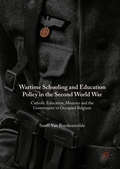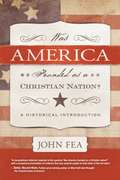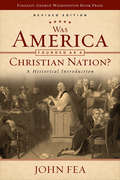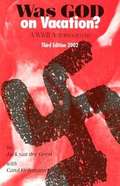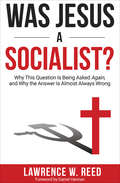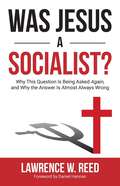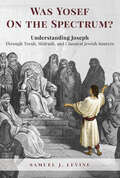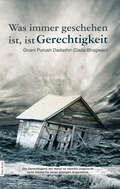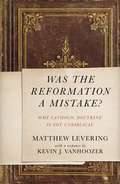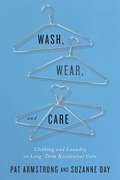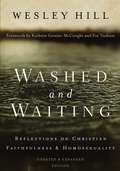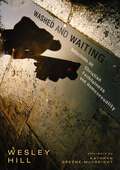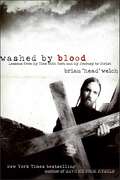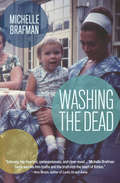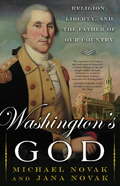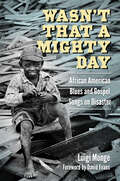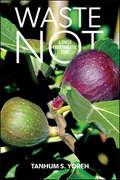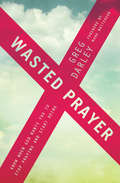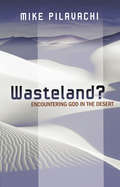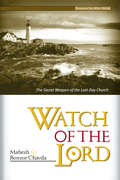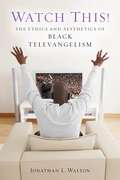- Table View
- List View
Wartime Schooling and Education Policy in the Second World War
by Sarah Van RuyskensveldeThis book deals with the development of private secondary schooling during the Second World War in Belgium. It focuses on how the German occupier used education to gain acceptance of the regime, and discusses the attitudes of Belgian education authorities, schools, teachers and pupils towards the German occupation. Suggesting that the occupation forced Belgian education authorities, such as the Roman Catholic Church, to take certain positions, the book explores the wartime experiences and memories of pupils and teachers. It explains that the German Culture Department was relatively weak in establishing total control over education and that Catholic schools were able to maintain their education project during the war. However, the book also reveals that, in some cases, the German occupation did not need total control over education in order to find support for some authoritarian ideas. As such, Van Ruyskenvelde's analysis presents a nuanced view of the image of the Catholic Church, schools, teachers and pupils as mere victims of war.
Warum ich die jüdische Religion verlassen habe, um Jesus nachzufolgen
by Bernard LevineIch bin sicher, Sie wären sehr überrascht, zu erfahren, dass Sie in den meisten jüdischen Häusern keine Bibel finden. Aber ist es nicht sehr merkwürdig, würden Sie sagen, dass Angehörige eines Volkes, das als „Volk des Buches“ bekannt ist, keine Bibeln zuhause haben? Ja, was sogar noch überraschender ist, ist, dass, obwohl man denken könnte, dass das jüdische Volk den Schriften folgt und sie gut kennt, die schockierende Wahrheit die ist, dass die meisten Bücher des Alten Testaments für Juden ein Mysterium sind, denn weder kennen sie die Prophezeiungen über Jesus in Büchern wie Hesekiel, Jesaja, Daniel und Maleachi, noch verstehen sie sie. Und wussten Sie, dass Juden gar nicht wissen, was sie sagen, wenn sie beten, weil die meisten Juden gar kein Hebräisch verstehen? Wie nun, werden Sie sich fragen, werden Juden von allen ihren Sünden gereinigt, wenn sie nicht an Jesus Christus glauben? Wie glauben Juden, sieht der Weg zum Himmel aus? Sie werden schockiert sein, herauszufinden, was in der jüdischen Welt vor sich geht.
Was America Founded as a Christian Nation: A Historical Introduction
by John FeaFea offers an even-handed primer on whether America was founded to be a Christian nation, as many evangelicals assert, or a secular state, as others contend.
Was America Founded as a Christian Nation?: A Historical Introduction
by John FeaJohn Fea offers a thoroughly researched, evenhanded primer on whether America was founded to be a Christian nation, as many evangelicals assert, or a secular state, as others contend. He approaches the title's question from a historical perspective, helping readers see past the emotional rhetoric of today to the recorded facts of our past. This updated edition reports on the many issues that have arisen in recent years concerning religion's place in American society—including the Supreme Court decision on same-sex marriage, contraception and the Affordable Care Act, and state-level restrictions on abortion—and demonstrates how they lead us to the question of whether the United States was or is a Christian nation. Fea relates the history of these and other developments, pointing to the underlying questions of national religious identity inherent in each. <P><P>"We live in a sound-bite culture that makes it difficult to have any sustained dialogue on these historical issues," Fea writes in his preface. "It is easy for those who argue that America is a Christian nation (and those who do not) to appear on radio or television programs, quote from one of the founders or one of the nation's founding documents, and sway people to their positions. These kinds of arguments, which can often be contentious, do nothing to help us unravel a very complicated historical puzzle about the relationship between Christianity and America's founding."
Was God on Vacation?
by Jack van der GeestA World War II autobiography of a Dutch youth during the years 1940-1947. An extraordinary account that follows the author through the invasion of the Netherlands, home life under the Nazis, Buchenwald death camp and escape, the French Underground, D-Day with the American 101st Airborne Division, the liberation of France and service in the Dutch Marines in the Asian campaign.
Was Jesus a Socialist?: Why This Question Is Being Asked Again, and Why the Answer Is Almost Always Wrong
by Lawrence W ReedEconomist and historian Lawrence W. Reed has been hearing people say &“Jesus was a socialist&” for fifty years. And it has always bothered him. Now he is doing something about it. Reed demolishes the claim that Jesus was a socialist. Jesus called on earthly governments to redistribute wealth? Or centrally plan the economy? Or even impose a welfare state? Hardly. Point by point, Reed answers the claims of socialists and progressives who try to enlist Jesus in their causes. As he reveals, nothing in the New Testament supports their contentions. Was Jesus a Socialist? could not be more timely. Socialism has made a shocking comeback in America. Poll after poll shows that young Americans have a positive image of socialism. In fact, more than half say they would rather live in a socialist country than in a capitalist one. And as socialism has come back into vogue, more and more of its advocates have tried to convince us that Jesus was a socialist. This rhetoric has had an impact. According to a 2016 poll by the Barna Group, Americans think socialism aligns better with Jesus&’s teachings than capitalism does. When respondents were asked which of that year&’s presidential candidates aligned closest to Jesus&’s teachings, a self-proclaimed &“democratic socialist&” came out on top. Sure enough, the same candidate earned more primary votes from under-thirty voters than did the eventual Democratic and Republican nominees combined. And in a 2019 survey, more than seventy percent of millennials said they were likely to vote for a socialist. Was Jesus a Socialist? expands on the immensely popular video of the same name that Reed recorded for Prager University in July 2019. That video has attracted more than four million views online. Ultimately, Reed shows the foolishness of trying to enlist Jesus in any political cause today. He writes: &“While I don&’t believe it is valid to claim that Jesus was a socialist, I also don&’t think it is valid to argue that he was a capitalist. Neither was he a Republican or a Democrat. These are modern-day terms, and to apply any of them to Jesus is to limit him to but a fraction of who he was and what he taught.&”
Was Jesus a Socialist?: Why This Question Is Being Asked Again, and Why the Answer Is Almost Always Wrong
by Lawrence W. Reed"If anyone was ever a socialist, it was Jesus."—Kelley Rose, Democratic Socialists of America Economist and historian Lawrence W. Reed has been hearing people say "Jesus was a socialist" for fifty years. And it has always bothered him. Now he is doing something about it. His new book demolishes the claim that Jesus was a socialist. Jesus called on earthly governments to redistribute wealth? Or centrally plan the economy? Or even impose a welfare state? Hardly. Point by point, Reed answers the claims of socialists and progressives who try to enlist Jesus in their causes. As he reveals, nothing in the New Testament supports their contentions. Was Jesus a Socialist? could not be more timely. Socialism has made a shocking comeback in America. Poll after poll shows that young Americans have a positive image of socialism. In fact, more than half say they would rather live in a socialist country than in a capitalist one. And as socialism has come back into vogue, more and more of its advocates have tried to convince us that Jesus was a socialist. This rhetoric has had an impact. According to a 2016 poll by the Barna Group, Americans think socialism aligns better with Jesus's teachings than capitalism does. When respondents were asked which of that year's presidential candidates aligned closest to Jesus's teachings, a self-proclaimed "democratic socialist" came out on top. Sure enough, the same candidate earned more primary votes from under-thirty voters than did the eventual Democratic and Republican nominees combined. And in a 2019 survey, more than 70 percent of millennials said they were likely to vote for a socialist. Was Jesus a Socialist? expands on the immensely popular video of the same name that Reed recorded for Prager University in July 2019. That video has attracted more than four million views online. Ultimately, Reed shows the foolishness of trying to enlist Jesus in any political cause today. He writes: "While I don't believe it is valid to claim that Jesus was a socialist, I also don't think it is valid to argue that he was a capitalist. Neither was he a Republican or a Democrat. These are modern-day terms, and to apply any of them to Jesus is to limit him to but a fraction of who he was and what he taught."
Was Yosef on the Spectrum?: Understanding Joseph Through Torah, Midrash, and Classical Jewish Sources
by Samuel J. LevineYosef's behaviors, interpersonal relationships, and personal development are often difficult to understand and seem to defy explanation. This book presents a coherent and cohesive reading of the well known Bible story that offers a plausible account of Yosef's behaviors, specifically those of an individual on the autism spectrum. Viewed through this lens, Yosef emerges as a more familiar and less enigmatic individual, exhibiting both strengths and weaknesses commonly associated with autism spectrum disorder.
Was immer geschehen ist, ist Gerechtigkeit
by Dada BhagwanWenn du sagst, dass alles, was geschieht, Gerechtigkeit ist, wirst du keine Fragen mehr haben. Dennoch sind die Menschen auf der Suche nach Gerechtigkeit und wünschen sich gleichzeitig die Befreiung. Das ist widersprüchlich. Du kannst nicht beides haben. Wo Fragen aufhören beginnt die Befreiung. In dieser unserer Wissenschaft, genannt Akram Vignan (das stufenlose Wissen des Selbst), bleiben keine Fragen übrig. Deshalb ist es für Menschen so einfach, ihr zu folgen. Param Pujya Dadashri (Meister der spirituellen Wissenschaft) hat der Welt die außergewöhnliche Entdeckung gegeben, dass es in dieser Welt niemals Ungerechtigkeit gibt. Alles, was geschehen ist, ist Gerechtigkeit. Die Natur weicht niemals von der Gerechtigkeit ab. Die Natur ist keine Person oder ein Gott, der unter irgendeinem Einfluss steht. Natur bedeutet, die sich bedingenden Umstände. So viele Umstände müssen stimmen, damit eine Aufgabe erfüllt werden kann.
Was the Reformation a Mistake?: Why Catholic Doctrine Is Not Unbiblical
by Kevin J. Vanhoozer Matthew LeveringWas the Reformation a mistake?In its actual historical context, it hardly seems fair to call the Reformation a "mistake." In 1517, the Church was in need of a spiritual and theological reform. The issues raised by Renaissance humanism - and by the profound corruption of the Church's leaders, the Avignon papacy, and the Great Schism in the fourteenth and fifteenth centuries - lingered unresolved. What were key theological problems that led to the Reformation?Theologian Matthew Levering helps readers see these questions from a Catholic perspective. Surveying nine key themes - Scripture, Mary, Eucharist, Monasticism, Justification and Merit, Saints Priesthood, and Scripture - he examines the positions of Martin Luther and makes a case that the Catholic position is biblically defensible once one allows for the variety of biblically warranted modes of interpreting Scripture. At the same time, Levering makes clear that he cannot "prove" the Catholic case.The book concludes with a spirited response by "mere Protestant" theologian Kevin J. Vanhoozer.X
Wasabi Gospel
by Shawn WoodHave you ever eaten wasabi? That dainty green blob on your sushi plate may look pretty tame, but take a taste--or even a whiff--and you'll find that little dollop packs a powerful punch to your senses! Jesus also looks pretty innocuous at first glance. He's the Good Shepherd, after all, the Prince of Peace. "Love your neighbor," he says. "Forgive others." If we take a closer look at those red-lettered words, however, we'll find that some of the most tame and sappy-sounding things Jesus said actually pack the most punch. Wasabi Gospel brings seven well-known gospel passages to life, unpacking their real significance and exploring what life would really look like if we lived out those seemingly-subtle commands of Christ. Jesus' words were radical for his audience and still are for us today, giving us a metaphorical punch to the gut and challenging us to the depths of our souls to change the way we live, love, and look at the world.
Wash, Wear, and Care: Clothing and Laundry in Long-Term Residential Care
by Pat Armstrong Suzanne DayClothing and appearance are steeped in social and personal significance, conveying individuals’ gender, class, culture, and occupation. In the communal setting of long-term residential care, where residents’ autonomy and mobility are often limited but their dignity and identity are paramount, clothes have become crucial issues and the source of tension for residents, their families, and staff. Assessing the neglected but important labour involved in ensuring that clothes promote respect for both the washers and the wearers, Wash, Wear, and Care analyzes the roles that laundry and clothing play in nursing homes, and raises questions about the wider social, political, economic, and historical contexts of these facilities. Drawing on interviews and observations from twenty-seven long-term residential care homes across Canada, Germany, Norway, Sweden, the United Kingdom, and the United States, Pat Armstrong and Suzanne Day provide an extensive and vital base of information on the daily organization, tasks, meanings, and concerns associated with clothing, laundry, dressing, and appearance in care facilities. An original study of an overlooked subject, Wash, Wear, and Care illuminates the shifting political and economic dynamics at work in long-term residential care homes and the health care system, raising larger theoretical and policy questions in the process.
Wash, Wear, and Care: Clothing and Laundry in Long-Term Residential Care
by Pat Armstrong Suzanne DayClothing and appearance are steeped in social and personal significance, conveying individuals’ gender, class, culture, and occupation. In the communal setting of long-term residential care, where residents’ autonomy and mobility are often limited but their dignity and identity are paramount, clothes have become crucial issues and the source of tension for residents, their families, and staff. Assessing the neglected but important labour involved in ensuring that clothes promote respect for both the washers and the wearers, Wash, Wear, and Care analyzes the roles that laundry and clothing play in nursing homes, and raises questions about the wider social, political, economic, and historical contexts of these facilities. Drawing on interviews and observations from twenty-seven long-term residential care homes across Canada, Germany, Norway, Sweden, the United Kingdom, and the United States, Pat Armstrong and Suzanne Day provide an extensive and vital base of information on the daily organization, tasks, meanings, and concerns associated with clothing, laundry, dressing, and appearance in care facilities. An original study of an overlooked subject, Wash, Wear, and Care illuminates the shifting political and economic dynamics at work in long-term residential care homes and the health care system, raising larger theoretical and policy questions in the process.
Washed and Waiting: Reflections on Christian Faithfulness and Homosexuality (Swindoll's New Testament Insights Ser.)
by Wesley Hill Kathryn Green-McCreight and Eve Tushnet*Is there a place for celibate, gay Christians in the church? * How do the gospel, holiness, and indwelling sin play out in the life of a Christian experiencing same-sex attraction? And how do brothers and sisters in Christ show love to them? Wesley Hill offers wise counsel that is biblically faithful, theologically serious, and oriented to the life and practice of the church. As a celibate gay Christian, Hill gives us a glimpse of what it looks like to wrestle firsthand with God's "No" to same-sex sexual intimacy. What does it mean for gay Christians to be faithful to God while struggling with the challenge of their homosexuality? What is God's will for believers who experience same-sex desires? Those who choose celibacy are often left to deal with loneliness and the hunger for relationships. How can gay Christians experience God's favor and blessing in the midst of a struggle that for many brings a crippling sense of shame and guilt? Weaving together reflections from his own life and the lives of other Christians, such as Henri Nouwen and Gerard Manley Hopkins, Hill offers a fresh perspective on these questions. He advocates neither unqualified "healing" for those who struggle nor accommodation to temptation, but rather faithfulness in the midst of brokenness.
Washed and Waiting: Reflections on Christian Faithfulness and Homosexuality (Swindoll's New Testament Insights Ser.)
by Wesley HillThis is a book written primarily for gay Christians and those who love them. Part memoir, part pastoral-theological reflection, this book wrestles with three main areas of struggle that many gay Christians face: (1) What is God’s will for sexuality? (2) If the historic Christian tradition is right and same-sex behavior is ruled out, how should gay Christians deal with their resulting loneliness? (3) How can gay Christians come to an experience of grace that rescues them from crippling feelings of shame and guilt? Author Wesley Hill is not advocating that it is possible for every gay Christian to become straight, nor is he saying that God affirms homosexuality. Instead, Hill comes alongside gay Christians and says, “You are not alone. Here is my experience; it’s like yours. And God is with us. We can share in God’s grace.” While some authors profess a deep faith in Christ and claim a powerful experience of the Holy Spirit precisely in and through their homosexual practice, Hill’s own story, by contrast, is a story of feeling spiritually hindered, rather than helped, by his homosexuality. His story testifies that homosexuality was not God’s original creative intention for humanity—that it is, on the contrary, a tragic sign of human nature and relationships being fractured by sin—and therefore that homosexual practice goes against God’s express will for all human beings, especially those who trust in Christ. This book is written mainly for those homosexual Christians who are trying to walk the narrow path of celibacy and are convinced that their discipleship to Jesus necessarily commits them to the demanding, costly obedience of choosing not to nurture their homosexual desires. With reflections from the lives of Henri Nouwen and Gerard Manley Hopkins, Wesley Hill encourages and challenges Christians with homosexual desires to live faithful to God’s plan for human sexuality.
Washed by Blood: Lessons from My Time with Korn and My Journey to Christ
by Brian WelchAn Out-of-Control Rock Star. An Inescapable Addiction to Drugs. A Miraculous Redemption through Jesus Christ.You think you've heard this story before but you haven't. Washed by Blood is a look at the dramatic saving power of Jesus Christ unlike any other—one that shows how God looks out for all of us, even those who seem farthest away from his grace. Brian "Head" Welch was a rock star who thought he had it all. He was the lead guitarist in Korn, one of the biggest and most controversial rock bands on the planet. He lived in a mansion, had millions of dollars in the bank, and legions of fans all over the globe. He was living the good life, and it should have been perfect. But it was all a lie.What no one knew was that backstage and away from the crowds, Head was fighting a debilitating addiction to methamphetamines, and that nothing—not even the birth of his daughter—could make him quit for good. He had given up. He was empty inside. He spent his days contemplating suicide convinced that each high would be his last. And that was when he found God.Washed by Blood tells the remarkable story of how God's unconditional love freed Head from his addictions and saved him from death. Here Head describes the joys and struggles of his journey to faith, detailing how Jesus has helped him cope with his pain and find the path that's right for both him and his daughter. An account of triumphs, hardships, and the healing power of Jesus, Washed by Blood is an inspirational demonstration that God is always there to save even the most troubled souls.
Washing the Dead
by Michelle BrafmanThree generations of women confront family secrets in this exquisitely wrought debut novel that examines the experience of religious community, the perilous emotional path to adulthood, and the power of sacred rituals to repair damaged bonds between mothers and daughters.<P><P> Michelle Brafman’s award-winning short stories and essays have appeared in the Washington Post, Slate, Tablet, Lilith Magazine, Bethesda Magazine and elsewhere. She teaches fiction writing at the Johns Hopkins University MA in Writing Program and lives in Glen Echo, Maryland with her husband and two children.
Washington's God: Religion, Liberty, and the Father of Our Country
by Michael Novak JanaIn Washington’s God Michael Novak-one of America’s leading neoconservative pundits-and his daughter, Jana, uncover George Washington’s religious life. Finally the record is set straight on the most thoroughly misunderstood aspect of Washington’s life. The Novaks focus on Washington’s strong trust in divine Providence and see this belief as providing the unifying narrative to his monumental life.
Wasn’t That a Mighty Day: African American Blues and Gospel Songs on Disaster (American Made Music Series)
by Luigi MongeWinner of the 2023 Award for Excellence for Best History in the category of Best Historical Research in Recorded Blues, R&B, Gospel, Hip Hop, or Soul Music from the Association for Recorded Sound CollectionsWasn’t That a Mighty Day: African American Blues and Gospel Songs on Disaster takes a comprehensive look at sacred and secular disaster songs, shining a spotlight on their historical and cultural importance. Featuring newly transcribed lyrics, the book offers sustained attention to how both Black and white communities responded to many of the tragic events that occurred before the mid-1950s. Through detailed textual analysis, Luigi Monge explores songs on natural disasters (hurricanes, floods, tornadoes, and earthquakes); accidental disasters (sinkings, fires, train wrecks, explosions, and air disasters); and infestations, epidemics, and diseases (the boll weevil, the jake leg, and influenza). Analyzed songs cover some of the most well-known disasters of the time period from the sinking of the Titanic and the 1930 Drought to the Hindenburg accident, and more. Thirty previously unreleased African American disaster songs appear in this volume for the first time, revealing their pertinence to the relevant disasters. By comparing the song lyrics to critical moments in history, Monge is able to explore how deeply and directly these catastrophes affected Black communities; how African Americans in general, and blues and gospel singers in particular, faced and reacted to disaster; whether these collective tragedies prompted different reactions among white people and, if so, why; and more broadly, how the role of memory in recounting and commenting on historical and cultural facts shaped African American society from 1879 to 1955.
Waste Not: A Jewish Environmental Ethic
by Tanhum S. YorehWinner of the 2020 Canadian Jewish Literary Award in the category of Jewish Thought and CultureBal tashḥit, the Jewish prohibition against wastefulness and destruction, is considered to be an ecological ethical principle by contemporary Jewish environmentalists. Waste Not provides a comprehensive intellectual history of this concept, charting its evolution from the Bible through classical rabbinic literature, commentaries, codes of law, responsa, and the works of modern environmentalists. Tanhum S. Yoreh uses the methodology of tradition histories to identify pivotal moments in the development of the prohibition—in particular, its transition into an economic framework. He finds that bal tashḥit's earliest stages of conceptualization connect the prohibition against wastefulness with avoidance of self-harm. This connection is commonplace within contemporary environmental thought and a universalizing Jewish principle with important contributions to be made to Jewish and general societal ecological discourse. This narrative provides a foundation for understanding bal tashḥit as an environmental ethic for today and tomorrow.
Wasted Prayer
by Greg DarleyFaith without obedience is dead. Prayer without action is wasted.What would your life look like if you stopped praying about God's will and just did it instead? How would your church look if it spent as much time serving as it spent praying about serving?The truth is, sometimes when you think you're praying, you're really just procrastinating. And when you think you're asking that God's will be done, you're really telling him no. In times that call for action, prayer can be disobedience in disguise. Wasted Prayer uncovers the ways we use prayer to dodge responsibility for the work God has assigned us.Complete with punch-in-the-gut biblical exposition that will help get you off your knees--and out of your chair--Wasted Prayer will provide you with the jolt you need to start living like a Christian, instead of just praying like one.It's time to stop praying and start doing.
Wasteland: Encountering God in the Desert
by Mike PilavachiMountaintops can be invigorating, but there&’s growth in the valleys. How do we understand and stay close to God when things may not always go right? In Wasteland Mike Pilavachi explores those difficult times in our lives when our dreams are unrealised and our spirituality feels dry and lifeless. Drawing from characters in the Old and New Testament, he puts together a biblical survival kit, so that hope shimmers on the horizon like a distant oasis.
Wat Sal Jy Doen As Jy Jesus Sien?
by Bernard LevineAs jy Jesus sien, wat sal jy Hom vra? Waaroor sal jy praat? Wat sal jy sê? Sal jy Hom aan jou familie en vriende voorstel? Hoe sal jy voel? Hoe sal dit wees om Jesus te ontmoet?
Watch Of The Lord: The Secret Weapon of the Last-Day Church
by Mahesh Chavda Bonnie ChavdaIf you long for revival in the church or seek personal renewal, God will meet you on your knees. The Holy Spirit of God invites you to enter a place of breathtaking holiness and awesome glory by experiencing the Watch of the Lord. There you'll discover your place as God's watchman for the End-Time church of Jesus Christ and be filled with His miraculous power in your daily life. Experiencing a manifestation of God's glory comes as a result of sustained, committed and regular corporate prayer. As you read, you will learn how the Watch of the Lord can: •Release in you a hunger for corporate revival •Pave the way for greater fruitfulness in evangelism in your life •Restore purity to the church •Push back the forces of evil in these wicked times •Respond biblically to a nation that is in perilWhether you intend to start your own prayer watch, or learn how to become a watchman on the wall alone, you will come away with practical, Scripture-based tools that will help you to experience more of God daily-and more of His glory and power in your life!
Watch This!: The Ethics and Aesthetics of Black Televangelism (Religion, Race, and Ethnicity)
by Jonathan L. WaltonAn analysis of African American televangelists as cultural iconsThrough their constant television broadcasts, mass video distributions, and printed publications, African American religious broadcasters have a seemingly ubiquitous presence in popular culture. They are on par with popular entertainers and athletes in the African American community as cultural icons even as they are criticized by others for taking advantage of the devout in order to subsidize their lavish lifestyles.For these reasons questions abound. Do televangelists proclaim the message of the gospel or a message of greed? Do they represent the "authentic" voice of the black church or the Christian Right in blackface? Does the phenomenon reflect orthodox "Christianity" or ethnocentric "Americaninity" wrapped in religious language?Watch This! seeks to move beyond such polarizing debates by critically delving into the dominant messages and aesthetic styles of African American televangelists and evaluating their ethical implications.
